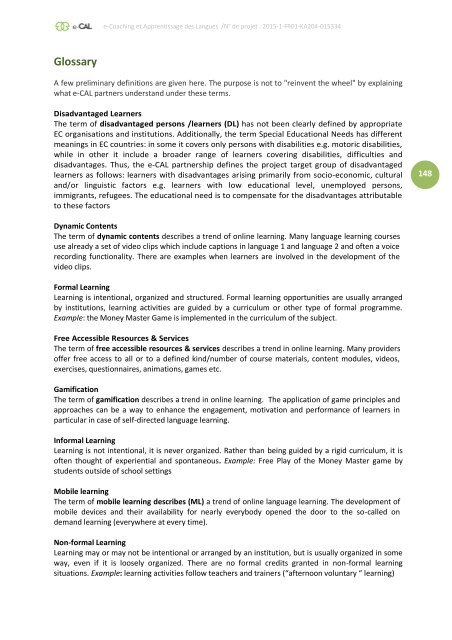e-CAL - e-Coaching et Apprentissage des Langues
The ERASMUS+ project e-CAL presents the result of an analysis of support methods in the case of language learning using web-based Open Educational Resources (OER).
The ERASMUS+ project e-CAL presents the result of an analysis of support methods in the case of language learning using web-based Open Educational Resources (OER).
You also want an ePaper? Increase the reach of your titles
YUMPU automatically turns print PDFs into web optimized ePapers that Google loves.
e-<strong>Coaching</strong> <strong>et</strong> <strong>Apprentissage</strong> <strong>des</strong> <strong>Langues</strong> /N° de proj<strong>et</strong> : 2015-1-FR01-KA204-015334<br />
Glossary<br />
A few preliminary definitions are given here. The purpose is not to "reinvent the wheel" by explaining<br />
what e-<strong>CAL</strong> partners understand under these terms.<br />
Disadvantaged Learners<br />
The term of disadvantaged persons /learners (DL) has not been clearly defined by appropriate<br />
EC organisations and institutions. Additionally, the term Special Educational Needs has different<br />
meanings in EC countries: in some it covers only persons with disabilities e.g. motoric disabilities,<br />
while in other it include a broader range of learners covering disabilities, difficulties and<br />
disadvantages. Thus, the e-<strong>CAL</strong> partnership defines the project targ<strong>et</strong> group of disadvantaged<br />
learners as follows: learners with disadvantages arising primarily from socio-economic, cultural<br />
and/or linguistic factors e.g. learners with low educational level, unemployed persons,<br />
immigrants, refugees. The educational need is to compensate for the disadvantages attributable<br />
to these factors<br />
148<br />
Dynamic Contents<br />
The term of dynamic contents <strong>des</strong>cribes a trend of online learning. Many language learning courses<br />
use already a s<strong>et</strong> of video clips which include captions in language 1 and language 2 and often a voice<br />
recording functionality. There are examples when learners are involved in the development of the<br />
video clips.<br />
Formal Learning<br />
Learning is intentional, organized and structured. Formal learning opportunities are usually arranged<br />
by institutions, learning activities are guided by a curriculum or other type of formal programme.<br />
Example: the Money Master Game is implemented in the curriculum of the subject.<br />
Free Accessible Resources & Services<br />
The term of free accessible resources & services <strong>des</strong>cribes a trend in online learning. Many providers<br />
offer free access to all or to a defined kind/number of course materials, content modules, videos,<br />
exercises, questionnaires, animations, games <strong>et</strong>c.<br />
Gamification<br />
The term of gamification <strong>des</strong>cribes a trend in online learning. The application of game principles and<br />
approaches can be a way to enhance the engagement, motivation and performance of learners in<br />
particular in case of self-directed language learning.<br />
Informal Learning<br />
Learning is not intentional, it is never organized. Rather than being guided by a rigid curriculum, it is<br />
often thought of experiential and spontaneous. Example: Free Play of the Money Master game by<br />
students outside of school s<strong>et</strong>tings<br />
Mobile learning<br />
The term of mobile learning <strong>des</strong>cribes (ML) a trend of online language learning. The development of<br />
mobile devices and their availability for nearly everybody opened the door to the so-called on<br />
demand learning (everywhere at every time).<br />
Non-formal Learning<br />
Learning may or may not be intentional or arranged by an institution, but is usually organized in some<br />
way, even if it is loosely organized. There are no formal credits granted in non-formal learning<br />
situations. Example: learning activities follow teachers and trainers (“afternoon voluntary “ learning)


